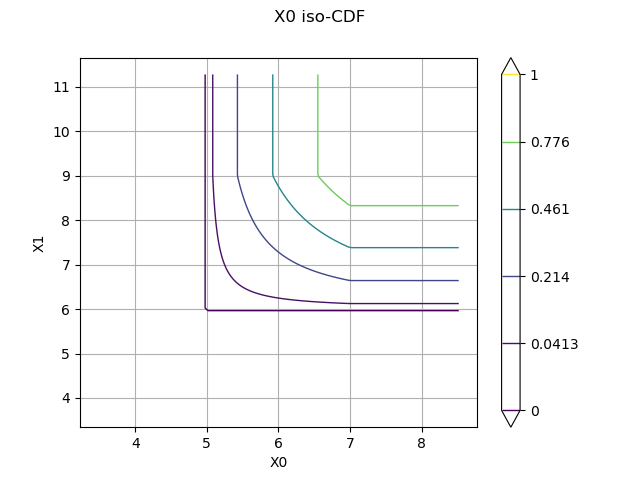Note
Go to the end to download the full example code.
Create a customized distribution or copula¶
In this example we are going to create a distribution or copula.
The way to go is inheriting the PythonDistribution, get the class and overload the methods of the Distribution object.
To create a Copula, the user has to overload isCopula() and return True.
Then an instance of the new class can be passed on into a Distribution object.
At least computeCDF should be overridden.
import openturns as ot
import openturns.testing as ott
import openturns.viewer as otv
import math as m
import warnings
warnings.filterwarnings("ignore")
ot.Log.Show(ot.Log.NONE)
Inherit PythonDistribution:
class UniformNdPy(ot.PythonDistribution):
def __init__(self, a=[0.0], b=[1.0]):
super(UniformNdPy, self).__init__(len(a))
if len(a) != len(b):
raise ValueError("Invalid bounds")
for i in range(len(a)):
if a[i] > b[i]:
raise ValueError("Invalid bounds")
self.a = a
self.b = b
self.factor = 1.0
for i in range(len(a)):
self.factor *= b[i] - a[i]
def getRange(self):
return ot.Interval(self.a, self.b, [True] * len(self.a), [True] * len(self.a))
def getRealization(self):
X = []
for i in range(len(self.a)):
X.append(
self.a[i] + (self.b[i] - self.a[i]) * ot.RandomGenerator.Generate()
)
return X
def getSample(self, size):
X = []
for i in range(size):
X.append(self.getRealization())
return X
def computeCDF(self, X):
prod = 1.0
for i in range(len(self.a)):
if X[i] < self.a[i]:
return 0.0
prod *= min(self.b[i], X[i]) - self.a[i]
return prod / self.factor
def computePDF(self, X):
for i in range(len(self.a)):
if X[i] < self.a[i]:
return 0.0
if X[i] > self.b[i]:
return 0.0
return 1.0 / self.factor
def getMean(self):
mu = []
for i in range(len(self.a)):
mu.append(0.5 * (self.a[i] + self.b[i]))
return mu
def getStandardDeviation(self):
stdev = []
for i in range(len(self.a)):
stdev.append((self.b[i] - self.a[i]) / m.sqrt(12.0))
return stdev
def getSkewness(self):
return [0.0] * len(self.a)
def getKurtosis(self):
return [1.8] * len(self.a)
def getMoment(self, n):
return [-0.1 * n] * len(self.a)
def computeCharacteristicFunction(self, x):
if len(self.a) > 1:
raise ValueError("dim>1")
ax = self.a[0] * x
bx = self.b[0] * x
return (m.sin(bx) - m.sin(ax) + 1j * (m.cos(ax) - m.cos(bx))) / (bx - ax)
def isElliptical(self):
return (len(self.a) == 1) and (self.a[0] == -self.b[0])
def isCopula(self):
for i in range(len(self.a)):
if self.a[i] != 0.0:
return False
if self.b[i] != 1.0:
return False
return True
def getMarginal(self, indices):
subA = []
subB = []
for i in indices:
subA.append(self.a[i])
subB.append(self.b[i])
py_dist = UniformNdPy(subA, subB)
return ot.Distribution(py_dist)
def computeQuantile(self, prob, tail=False):
p = 1.0 - prob if tail else prob
quantile = list(self.a)
for i in range(len(self.a)):
quantile[i] += p * (self.b[i] - self.a[i])
return quantile
Let us instantiate the distribution:
distribution = ot.Distribution(UniformNdPy([5, 6], [7, 9]))
And plot the CDF:
graph = distribution.drawCDF()
view = otv.View(graph)

We can easily generate sample:
distribution.getSample(5)
or compute the mean:
distribution.getMean()
Also we can compute the probability contained in an interval:
distribution.computeProbability(ot.Interval([5.5, 6], [8.5, 9]))
0.75
Now let us validate our distribution with openturns.testing.DistributionValidation
It automatically checks the consistency of most services and allows one to check for errors.
checker = ott.DistributionValidation(distribution)
checker.run()
otv.View.ShowAll()
Total running time of the script: (0 minutes 3.744 seconds)
 OpenTURNS
OpenTURNS